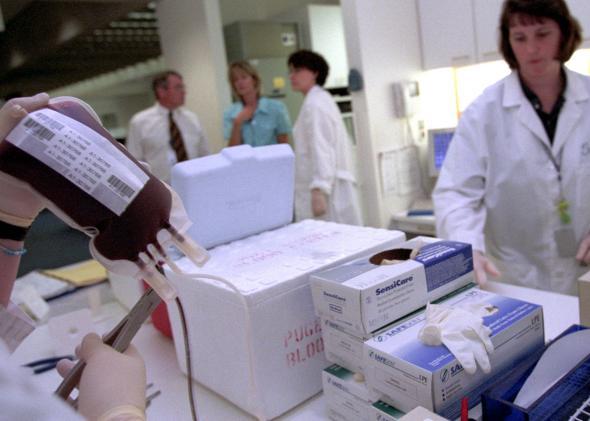Europe’s highest court, the European Court of Justice, issued a judgment yesterday requiring nations to base their blood donation policies on the latest scientific evidence, not potentially biased assumptions. The ruling made clear that singling out a particular demographic group as unable to donate blood should be the approach of last resort, used only if no other reliable means of screening blood exists. As the United States Food and Drug Administration prepares to modify its own policy for screening out HIV-positive individuals from donating blood, it should adopt a similar, evidence-based protocol that does not unfairly stigmatize gay and bisexual men.
Specifically, the ECJ held that before France could exclude all gay and bisexual men from donating blood because of the perceived risk that such men are—as an entire class—at a higher risk of being HIV-positive, France must undergo a three-step process.
First, France must determine “in light of current medical, scientific and epidemiological knowledge,” whether men who have sex with men in France are still at statistically high risk of acquiring and spreading HIV.
Second, and more important, even if France concludes that HIV is more prevalent among men who have sex with men, the country must determine if effective scientific techniques exist for screening out HIV-positive blood donations without the wholesale barring of gay and bisexual men from donating blood.
Third, even if no scientific method exists for screening out HIV-positive blood, France must determine whether medical interviews and questionnaires might be used to reliably identify high-risk sexual behavior more accurately and “less onerous[ly]” than a complete ban on donations from gay and bisexual men.
Because reliable and accurate scientific techniques do exist for testing and excluding donated blood that is infected with HIV, a complete ban on donations from men who have sex with men would fail this evidence-based test. Permitting gay and bisexual men to donate blood would not only meaningfully increase the blood supply, but would also go a long way toward reducing stigma and misunderstandings regarding both HIV and LGBTQ individuals.
By suggesting that gay and bisexual men are, as a group, uniquely connected with HIV rather than targeting high-risk, unsafe sexual conduct (such as unprotected sex with multiple partners), donation bans increase fear and intolerance toward gay and bisexual men, as well as heterosexual and bi trans women. But the gay and bisexual blood ban also feeds the inaccurate belief that other populations are somehow insulated from contracting HIV—a dangerous misperception for public health.
In December, the FDA announced plans to move from a lifetime ban for men who have had sex with men to a ban for any man who has had sex with another man within the year prior to donating. As outlined previously by Slate’s Mark Joseph Stern, this revision, while a modest step in the right direction, is inadequate. By requiring celibacy for a year prior to donating blood, the proposed revised policy, in practice, amounts to a lifetime ban for many gay and bisexual men. A one-year deferral policy would also continue to bar gay men in monogamous relationships from donating blood, notwithstanding that such individuals are at low risk of contracting HIV.
Moreover, as forcefully explained by others such as Harvard’s Glenn Cohen, the year-long deferral policy is not rationally related to any scientific window period for testing. In other words, tests used to screen blood donations are able to determine whether HIV is in the blood much sooner than a year after infection. Indeed, just this week, an at-home blood test kit that detects HIV contracted over 90-days prior became available for purchase in the United Kingdom, and an oral at-home test has been available in the United States since 2012. (Note that it may be advisable for users of at-home test kits to have their results confirmed by healthcare professionals.) The tests used to screen blood donations are even more sophisticated.
Accordingly, as the FDA continues to mull revisions to its blood donation policy, it should follow the European Court of Justice’s lead and recommit to an evidence-based policy for determining whether someone is at risk of providing HIV-positive blood. By ending its discrimination against gay and bisexual men, the FDA can continue to ensure the safety of the blood supply and improve public health outcomes by not perpetuating myths that gay and bisexual men are somehow uniquely prone to HIV. In turn, the FDA would encourage everyone, regardless of sexuality, to remain vigilant with regard to the unsafe practices and behavior that spread sexually transmitted diseases.
